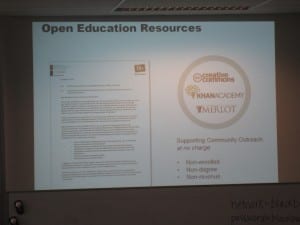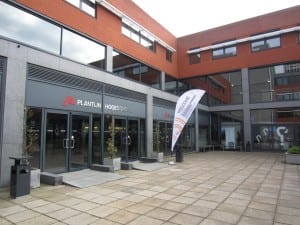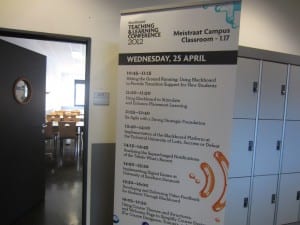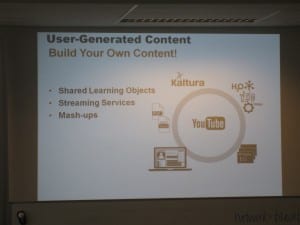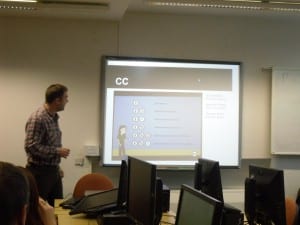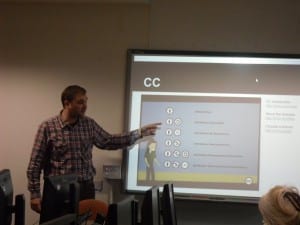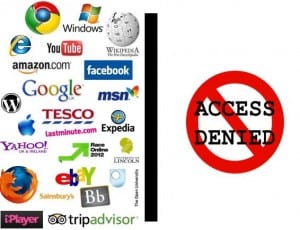Being involved with promoting open education for over a year, I read with interest the news about Edublogs and Pearson. As the name suggests, Edublogs is a free blogging service for educationalist with, at the time of writing, 269,055 subscribers and, according to BBC News, 1.5 million blogs. Pearson are educational publishers, with a keen eye on licencing and copyright, who noticed a blogger had made the Beck Hopelessness Scale questionnaire (current cost $120) freely available to a group of students without permission from the copyright holders – Pearson. Upon request the Edublog administrators altered the visibility of this post so it was no longer publically available but the host, ServerBeach, saw it within the Edublog software; not publically available but still in existence and allegedly infringing copyright. Claiming they received no response from Edublogs, ServerBeach shut down the entire site. One rogue blog and 1.5 Million blogs are made unavailable. Resistance to open education and open education resources is to be expected. The concept of giving away for free what has traditionally been hidden behind closed locked doors can be a major paradigm shift and not one to be achieved overnight. The World Wide Web was designed as democratic space but that freedom has inevitably been taken over by the multi international publishing corporations who have transferred their existing restrictions into online environments. Even those totally against the principles of open education, must surely not be in agreement with this sort of power – especially when the offending item was hidden from public view in the first place.
Category: Embedding OER Practice
open education – applying theory to practice
Embedding OER Practice is HEA/JISC funded project with a dual nature; one part has been engaging with the philosophy and practice of OER and the other looking for ways to embed OER practice as a whole institution strategy http://oer.lincoln.ac.uk At Lincoln we’ve been looking at making units of learning freely available under a Creative Commons licence, while elsewhere in the world the principles of open academic practice have extended into full courses (OU, MIT, Stanford) and free online learning platforms (P2P , OERu)
The move from individual learning activities to modules and courses is an inevitable transition and, as with all educational content development work, it’s valuable apply theory to practice and have the experience of being a student. These past two week I’ve been taking part in Designing for Collaborative Learning, an online course for members of the JISC community. The course has come out of the P2.0PLE project (Peer-2.0-Peer Learning Enhancement), led by the Beyond Distance Research Alliance, University of Leicester and was free, although the small print says the University of Leicester reserves the right to charge a fee of £100 to any individual who registers and fails to take part. Run through Course Sites (www.coursesites.com) which is Blackboard’s contribution to open education, students are given evidence of participation (no HE credits) and the course materials (including all e-tivities) are open educational resources, released under a Creative Commons BY (attribution) licence. A blog about the experience of being a p/t online student will follow shortly.
I’ve also registered on Open Content Licensing for Educators a week long course in December. OCL4Ed is available through http://wikieducator.org Use this link to register http://wikieducator.org/Open_content_licensing_for_educators/Home
Designed for educators who want to learn more about open education resources, copyright, and creative commons licenses, OCL4Ed is sponsored by the OER Foundation, the COL Chair in OER at Otago Polytechnic, the UNESCO-COL Chair in OER at Athabasca Universityand Creative Commons Aotearoa New Zealand The collaborative development was enabled by volunteers from the:WikiEducator community, OpenCourseWare Consortium and Creative Commons. This should be an interesting first hand experience of what international open education is all about.
Embedding OER Practice at the HEA Conference 2012
Digital ways of working are changing the way we communicate and manage information. The implications for higher education include more virtual management of teaching, learning and research, greater online collaboration and more steps towards openness. The open education movement with its emphasis on using, reusing and repurposing is an inevitable consequence of the internet and one we have to accept. As VC of the OU Martin Bean said in his excellent opening keynote, the internet is here to stay, students have increasing expectations of openness and sharing, and OER is an ustoppable force.
At Lincoln we are embedding OER practice and investigating the use of OER to support generic aspects of the student experience; transition, reflection, graduate attributes and eportfolios. We are developing a postgraduate online course called Teaching and Learning in a Digital Age which will be offered as part of the university’s Teacher Education Programme. This will be based on content released as OER, include activities which encourage staff to search for OER in their own discipline and consider releasing some of their own content as OER. All this within the context of the shift from classrooms to virtual environments.
The Creative Commons website http://creativecommons.org has information about the six different OER/Creative Commons licences and a tool for deciding which to choose. OER don’t have to be all singing all dancing multimedia. They are about learning experiences. One single learning activity, designed as a package with alternative formats and information about the level it is designed for and how it has been used, can be more powerful than any amount of expensively produced high end content.
The Embedding OER Practice blog is at http://OER.lincoln.ac.uk and our Twitter hashtag is #openlincoln. On 21st June we held a conference called Sharing Practice: Open Approaches to Teaching and Learning This is the language we are using to take the project forward. OER don’t exist in isolation. They are part of the bigger picture which is about sharing practice and about open approaches to the way in which we manage pedagogy in a digital age.
Sharing Practice; Open Approaches to Teaching and Learning
Sharing Practice; Open Approaches to Teaching and Learning is a one day event, taking place in the Main Admin Building, Brayford, on 21st June, 9.30-4.00. The event will be showcasing the best practice in open education and open educational resources (OER) at Lincoln, including sharing outputs from the HEA/JISC funded project Embedding OER Practice which is currently ongoing. For more details about the project and to book a place on the Sharing Practice event please go to http://oer.lincoln.ac.uk/2012/05/22/sharing-practice-event-booking-form
Keynote speakers are Steve Stapleton, Open Learning Support Officer, University of Nottingham, talking on Integrating open throughout the University, the Open Nottingham story, and Paul Andrews Head of the Centre for Digitally Enhanced Learning (CDEL), Newport University, Wales, talking on OER Signposts: Tools and Techniques for getting started. There will also be presentation from Pam Locker Principle Teaching Fellow from the School of Architecture who is the creative force behind the Pencils and Pixels resource if you ever wanted to draw but felt you didnt know where to begin then these instructional videos are for you. After Pam, Jose Gonzales Rodriguez, Reader from School of Life Sciences, will be demonstrating Chemistry FM, a full first year module which has been licensed as an OER is you ever thought chemistry was not for you then this is guaranteed to change your mind. The event will close with a Question and Answer Plenary with Steve Stapleton, Paul Andrews and other presenters.
Embedding OER Practice is running in parallel with an HE Change Academy strand. On the one hand we’re looking at promoting the philosophy and practice of OER while on the other we are looking at ensuring the sustainability of project outcomes. When the project comes to an end the practice of sharing open educational practice continues. The aim the day is to provide time and space to begin wider discussions around open education and the use of open educational resources.
Blackboard meets open education?
Blackboard is now marketing itself as a multiple learning platform, one which supports both commercial software and open source content. Blackboard CourseSites, launched in 2011, is a free, cloud-based opportunity for releasing teaching and learning courses as OER. Register for free at https://www.coursesites.com/webapps/Bb-sites-course-creation-BBLEARN/pages/index.html and start building your course. Alternatively try a free course. Blackboard is promoting CourseSites with Instructional Ideas and Technology Tools for Online Success led by Dr. Curtis Bonk http://travelinedman.blogspot.co.uk/ which focuses on successful strategies and approaches to online learning, course design and facilitation.
Making education ‘open’ is a current trend and the release of OER under a Creative Commons licence takes full advantage of the affordances of the Internet to offer any-time any-place access to information and knowledge. Blackboard is a corporate giant in the world of commercial education and its not immediately clear if this move into the ‘free’ world is an example of genuine altruism or if there is a hidden agenda. On the surface it looks good. Instructors can post course materials, communicate with students and manage grades, but what are the disadvantages?
You are restricted to five ‘live’ courses although if you need more, then old ones can be hidden creating space for additional new ones. CourseSites cannot be integrated with existing systems and it isn’t clear how you would package up your course and export it somewhere else. Looking at the available literature online it seems the best way to find out the pros and cons is to use CourseSites to create a course so I’m experimenting with making some of the Getting Started transition materials available as OER in this way.
There is mention of a planned Blackboard Building Block to enable institutions to showcase courses that are open for learning. Instructors will apparently be able to share OER courses via Facebook and Twitter, but whether or not this Building Block has been released is unclear. For now you can use the Publish Open Resource link in Packages and Utilities which offers space for keywords and gives you the course URL with a BY Creative Commons licence attached.
‘Attribution CC BY: this license lets others distribute, remix, tweak, and build upon your work, even commercially, as long as they credit you for the original creation. This is the most accommodating of licenses offered. Recommended for maximum dissemination and use of licensed materials.
Blackboard meets open education – this could be an interesting space to watch…
Creative Commons Licensing
Part of the Team Six Workshop, OER, Copyright and Licencing, looked at Creative Commons licences. Creative Commons is the infrastructure built to allow content creators legal controls over the copyright of the their work. More information about Creative Commons can be found on the Creative Commons site and the Lincoln Academic Commons site at http://commons.lincoln.ac.uk/creative-commons There are six different Creative Commons licences, each one giving the conditions under which the content can be shared, re-designed and re-licenced either commerically or non-commercially. Each licence can be identified with a relevant logo.
Attribution. CC BY. This licence means other people can use and reuse the OER, including commercially, as long as the original author is credited. This licence is recommended for ensuring content is most widely shared.
Attribution ShareAlike. CC BY SA. This license includes the same criteria as Attribution but anyone re-purposing it must license the new materials under identical terms.
Attribution-NoDerivs. CC BY ND. This license allows for commercial and non-commercial redistribution but it cannot be changed and the original author is credited.
Attribution-NonCommercial. CC BY-NC. This license is for non-commercial use. It allows others to re-use and re-purpose content. The original author must be cited but the new work does not have to be licenced under identical terms.
Attribution-NonCommercial-ShareAlike. CC BY-NC-SA. This license is for non-commercial use. It allows others to re-use and re-purpose content. The original author must be cited and the new work must be licenced under identical terms.
Attribution-NonCommercial-NoDerivs. CC BY-NC-ND. This is the most restrictive license. Work can be downloaded and shared, the original author must be credited but not changes can be made and the work must not be used commercially.
The Creative Commons site contains more information about background and development of these licence and also has a licence choosing tool designed to help you select the right licence for your own work.
Because the creator has the control over the copyright, sharing and distribution of their work, this is sometimes referred to copyleft.
Taking a risk with copyright
OER Copyright and Licenses was the first Embedding OER Practice workshop run by Paul Stainthorp, Julian Beckton and Joss Winn. The session introduced the complexities of copyright legislation. In a world where the internet has become the first destination of choice when it comes to creating teaching and learning content, it offers an infinite source of materials and there are many common myths about their usage
- “It’s OK if it’s in a closed environment like Blackboard.”
- “If people put things (e.g. images) on the WWW, they can’t mind me using them.”
- “No-one’s going to sue the University over it.”
All of these are incorrect. It’s worth bearing in mind that in the copyright world everything belongs to someone. So although taking and reusing online content is easy, there are a complex set of rules and regulations to be aware of. Unfortunately there is also no single answer as to what can or cannot be taken but some guidelines are more fixed than others. For example you can reuse content if:
- You are the originator therefore you have the copyright
- You have the permission from the originator to reuse their materials
- The materials have a creative commons licence stating they are freely available
- The content is covered by a university licence to be used
- The content copyright has expired (usually a 70 year time span)
- The amount copied is not considered substantial
- You can claim a defence of fair dealing
The last two are where the complexity begins. Substantial is undefined. For example a square taken from the face of the Mona Lisa would be more substantial than the same sized square taken from the bottom right of the picture. The face would be more recognisable than her dark clothes so has a different significance in terms of copyright legislation. The defence of fair dealing is also an arbitrary ruling. While the work of others can be copied for criticism or review – e.g. teaching and learning – we can’t rely on this as a defence in law that the action was justified. There is no exception to copyright for education purposes in the UK as there is in other countries and the concept of fair dealing is less applicable in law than is often realised. When we take content there is always a risk and individuals have to consider the level of that risk.
Everything belongs to someone. A colleague gave the useful example of wanting to use the London Underground tube map in a book and having the publishers request permission. London Transport agreed but with restrictions on the artwork and a fee of £300. This applies to logos and trademarks and was relevant to me – when I talk about the digital divide I use the slide below.
How illegal is this? What is the risk level of stealing all these logos for educational purposes? Scary stuff if only because this illustrates how easy it is to do this without thinking through the potential consequences.
What all this does do is reinforce the value of Creative Commons licences which will be looked at next.
Change Academy Start-up Meeting
Today is the start of a HEA Change Academy programme. This is part of the Embedding OER Practice in Institutions project here at the University of Lincoln. The project is looking at the philosophy and practice of open education and the use and reuse of OER and embedding that practice across the whole institution. The Change Academy is about supporting institutional change by working with staff and students to create those conditions most conducive to change. Engagement with OER is part of a much wider picture of the use of technology for learning which includes VLEs, Web 2.0 style tools and social media –as well as familiarity with the open education movement in general and open educational resources in particular. Even higher and wider to this is the individual need for confidence and competence working within digital environments and understanding what makes effective digital learning experiences. All of this involves change – in particular the adoption of digital literacies – those skills and understandings which are essential to teaching, learning and professional practice in a digital age. The Change Academy will help ensure individual project outcomes can be sustainable and identify ways for embedding them at departmental and Faculty level while overall project guidance to OER practice within teaching and learning aims to bring in all other academic and professional support staff from across the university. Watch this space for further developments…
2012 is going to be an exciting year…
See my post on Embedding OER Practice for more details about the HEA/JISC funded project to look at the use of open educational resources for teaching and learning. Here are some more reasons why this is going to be an exciting opportunity to put the spotlight on virtual teaching and learning experiences. Embedding OER Practice will draw attention to the role of online learning across the university as well as highlighting the effective use of digital resources. The project will promote the advantages of the open education movement and support staff in becoming more familiar with terms like Creative Commons, Lincoln Academic Commons, public copyright licences, Shuttleworth Foundation, Capetown Open Educational Declaration and the accessing and contributing to repositories of learning content
As well as offering experience with finding, evaluating, using, repurposing and replacing open educational resources, the project is an ideal opportunity for addressing the wider issues around supporting the digital literacies of staff and students.The term digital literacies is popular at the moment. The JISC Developing Digital Literacies programme is currently funding a number of projects across the sector, all aimed at promoting digital literacies strategies and approaches. This is a necessary step forward. For too long those with technical competence have made assumptions about those without. The result is a widening digital divide, exacerbated by a determinist view of technology having transformative potential, not only for access to learning environments which cross barriers of time and distance, but to cut costs and increase efficiency. All this underpins investment in the digital teaching and learning platforms promoted across the sector as a means for institutions to achieve key strategic aims (HEFCE 2005, 2009*). The missing element from these grand schemes has always been the human one; how best to scaffold support for the necessary changes in attitudes, behaviours and practice. Promoting digital literacies is an ideal way to address these issues full on.
The term digital literacies is defined as ‘the confident and critical use of ICT for work, leisure, learning and communication‘ or ‘the ability to locate, organize, understand, evaluate, and analyze information using digital technology’. Focusing on the embedding OER practice offers multiple opportunities to ensure digital literacies is on the agenda – and from there it is a small step to include awareness of exclusive and inclusive practices with digital environments and critical reflection on the boundary lines between private/personal and public/professional online identities and behaviours.
Oh yes, 2012 is going to be a very exciting year!
| Follow the OER project blog here http://oer.blogs.lincoln.ac.uk |
* Higher Education Funding Council for England (HEFCE) (2OO9) Enhancing learning and teaching through the use of technology. A revised approach to HEFCE’s strategy for e-learning.
* Higher Education Funding Council for England (HEFCE) (2OO5) Enhancing learning and teaching through the use of technology.
Embedding Open Educational Resources (OER)
Embedding Open Educational Resources (OER) Practice in Institutions is a £50,000 project funded under the HEFCE/JISC/HEA OER Programme: Higher Education Institutional Change (HEIC) Strand. The aim of the project is to support Open Educational Resources (OER) policy and practice as a whole institution approach here at the University of Lincoln. Six project teams have been set up to look at how OER can be used to support different aspects of the student experience and I will be coordinating their progress over the next year. The six project areas are:
- Supporting Transition with OER
- Using OER to introduce the processes of reflection/critical thinking in Year One Semester One.
- Exploring the use of OER for embedding ‘employability’ in the undergraduate curriculum.
- OER and e-portfolios for students and practice educators or mentors on undergraduate and postgraduate work-based learning award.
- Exploring and embedding the use of OERs on PGCert/HE…and beyond.
- Project Six: Behind the Scenes: supporting OER as a whole institution philosophy.
Alongside scoping, using and repurposing OER, the HEA will run an internal Change Academy programme at Lincoln. This process includes specific development opportunities for the team leaders and an ongoing support network for all team members. The Change Academy programme supports both rapid innovation and capacity-building for longer-term change and aims to provide creative environments to focus on planning and developing strategies for lasting change. This will be an excellent way to expand the outcomes and successes of individual projects across the wider departments and Faculties while working towards the institution wide adoption of the philosophy and practice of OER. In doing so there will also be opportunities to surface the associated digital literacies requirements of students and staff and address inclusive digital practices. A win-win situation!
Further details about the programme can be found at the project blog http://oer.blogs.lincoln.ac.uk
